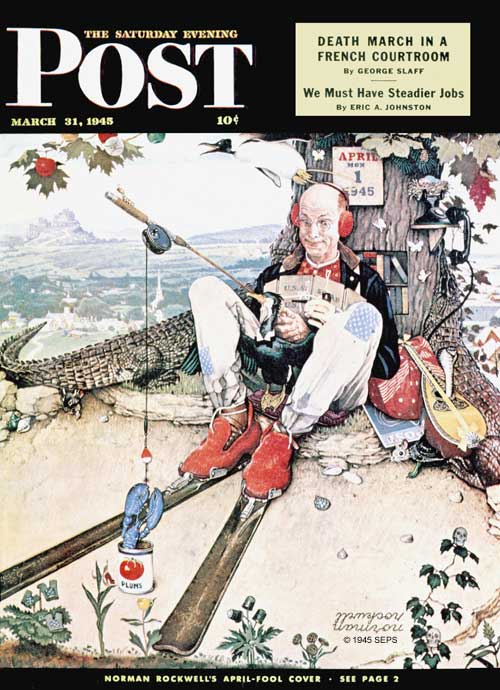Norman Rockwell’s 1945 April Fools’ Saturday Evening Post Cover
April the first stands mark'd by custom's rules,
A day for being, and for making fools: —
But, pray, what custom, or what rule supplies
A day for making, or for being — wise?
Rev. Samuel Bishop, 1796
Wow! Today April 1st is April Fools' Day. Do your students know the origin?
An observance which takes place in western countries on 1st April, traditionally known as April Fools' Day or All Fools' Day.
In France we call it Poisson d'Avril — "April Fish") during which merriment is supposed to reign and pranks, practical jokes, and hoaxes are socially sanctioned.
Poisson d'Avril in France
credits: C. Gonthier/20 Minutes
Customary practices range from simple tricks played on friends, family, and coworkers to elaborate media hoaxes concocted for mass consumption.
Poisson d'Avril in France
credits: C. Gonthier/20 Minutes
- Theory of origin:
The origins of April Fools' Day are obscure. The most commonly cited theory holds that it dates from about 1582, the year France adopted the Gregorian Calendar, which shifted the observance of New Year's Day from the end of March - around the time of the vernal equinox - to the first of January.
However, the earliest known historical reference to April Fools' Day occurs in a Dutch poem published in 1561, which predates the adoption of the Gregorian calendar by some 21 years.
The ancient Romans, for example, celebrated a festival on March 25 called Hilaria, marking the occasion with masquerades and "general good cheer."
Holi Hindu Festival of Colors
credits: unknown
Holi, the Hindu "festival of colors" observed in early March with "general merrymaking" and the "loosening of social norms," is at least as old.
The Jewish festival of Purim has a long history, as well. Coinciding with the advent of spring, it's celebrated annually with costume-wearing, carnivals, and pranks.
Poisson d'Avril / April Fools Day
via © French Moments
Education:
"Being funny can also be a useful way to point out what is wrong with the world."
Time | Science
What a good activity to propose to your students! The study of the origin of this traditions in different countries and civilizations.
- Ask your students to make a serious research about the theory of origin of April Fools' Day;
- Search for countries where April Fools' Day is celebrated with pranks and jokes;
- For the oldest - Secondary Education - there is an interesting article on Science section of Time: April Fool's Day in not Joke that I really recommend in Humanities lessons.
It's a good resource to start a rich and enjoyable debate between students and teachers about the humorist side of people in our days.
Curricula : History ; Languages ; Philosophy ; Sociology ; Arts.
Levels : All levels
Every teacher must adapt the activities to the level they are teaching.
Each 1st April Google, Microsoft, media and dozens of other tech companies deliver a flood of gags to the web.
This year, there’s plenty to make you laugh, from Nintendo-infused mobile maps to a couple of ways to capitalize on the selfie craze.
This year, there’s plenty to make you laugh, from Nintendo-infused mobile maps to a couple of ways to capitalize on the selfie craze.
I really like the April Fools' Day joke from the European Organization for Nuclear Research, (CERN) :
So, as you see, there are a good number of digital resources that you could explore in your class.
Hope you enjoy to explore traditions with humor and some good laughs in your classroom.
"Comedy challenges assumptions and humor broadens perspectives, thus enhancing creativity".
Time | Science
G-Souto
01 April 2014
updated: 01.04.2023
Copyright © 2023G-Souto'sBlog, gsouto-digitalteacher.blogspot.com®

Education : April Fools' Day : origin & traditions ! by G-Souto is licensed under a Creative Commons Attribution-NonCommercial-NoDerivatives 4.0 International License.
updated: 01.04.2023
Copyright © 2023G-Souto'sBlog, gsouto-digitalteacher.blogspot.com®

Education : April Fools' Day : origin & traditions ! by G-Souto is licensed under a Creative Commons Attribution-NonCommercial-NoDerivatives 4.0 International License.








No comments:
Post a Comment